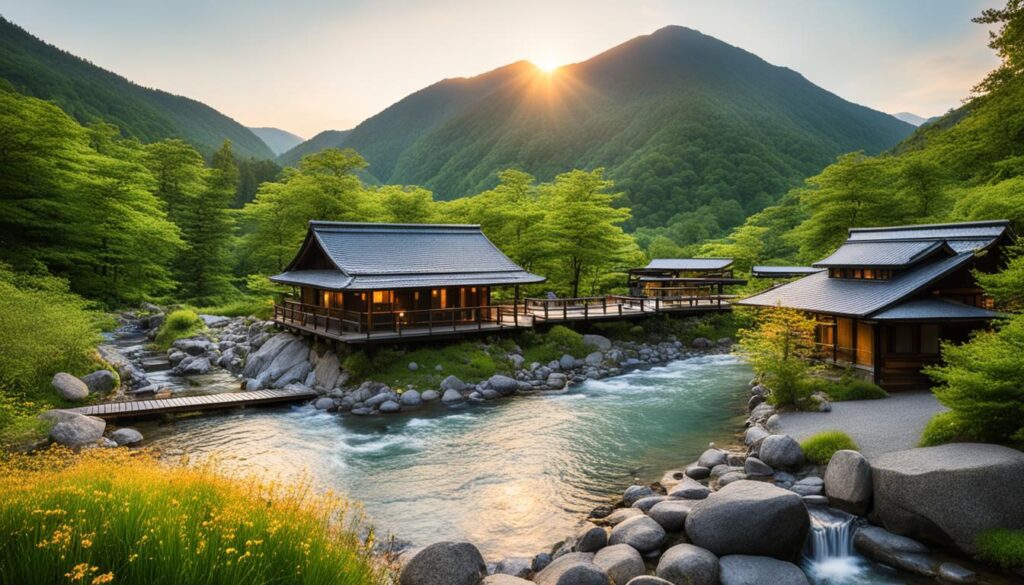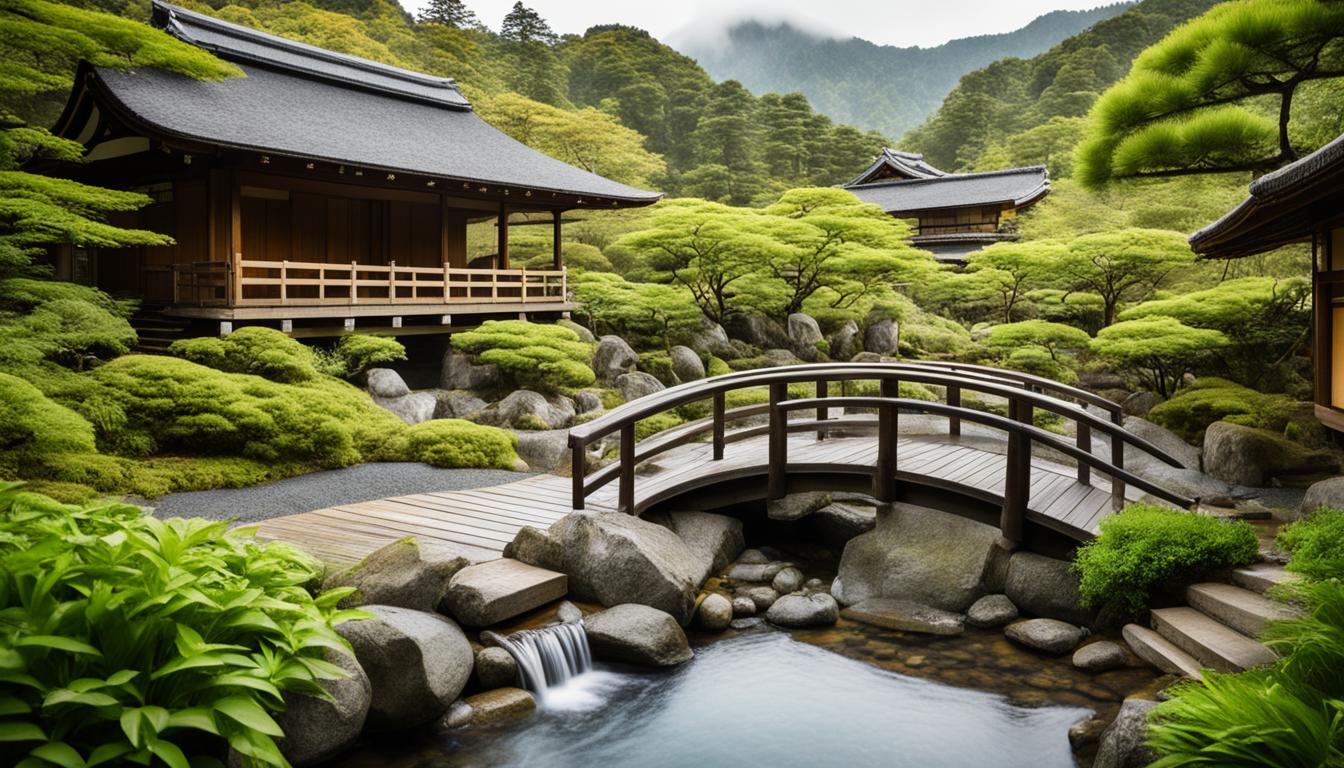Are you dreaming of an exclusive hot spring experience in Japan? Look no further than private onsen, where you can indulge in the traditional Japanese bathing culture and enjoy a luxurious and private onsen reservation. Whether you seek a hidden onsen retreat, an authentic onsen experience, or secluded onsen accommodation, Japan has it all. In this ultimate guide, we’ll take you through the top private onsen places, provide tips for booking a private onsen bathhouse, and help you navigate the world of premium and exclusive onsen spa experiences.
What is Onsen and How is it Different from Sentō?
Onsen, derived from the Japanese words for “hot” and “springs,” have been a source of healing and relaxation for centuries. Onsen facilities can be both the natural hot springs themselves and the bathing facilities surrounding them. In contrast, sentō are original public bathhouses that have also been part of Japanese culture for centuries. While onsen are known for their healing properties and revitalizing effects on the skin and muscles, sentō primarily serve the purpose of keeping people clean. Onsen are typically located near volcanic mountains, offering scenic views, while sentō are more commonly found in town centers.
Natural Onsen vs. Man-made Sentō
When it comes to Japanese bathing culture, two main types of bathing facilities stand out: natural onsen and man-made sentō. Understanding the difference between these two options is key to truly immersing yourself in the traditional Japanese bathing experience.
Natural onsen are pools of water that are filled with volcanic spring water. One of the defining characteristics of natural onsen is the milky appearance and sulfuric smell of the water. This is due to the rich mineral content found in volcanic spring water. The minerals present in natural onsen have various health benefits for the skin and body. Soaking in a natural onsen can help relax muscles, improve blood circulation, and promote overall well-being.
However, it’s important to note that not all natural springs qualify as onsen according to onsen laws. These laws specify certain criteria that a natural spring must meet to be classified as an onsen. For example, the water temperature and mineral content must meet specific standards. This ensures that visitors can truly experience the health benefits associated with natural onsen.
On the other hand, man-made sentō are bathhouses that use heated tap water. While they may not have the natural volcanic spring water found in onsen, some sentō facilities add minerals and infusions to the water, providing additional health benefits. However, it’s important to note that sentō are not typically known for their therapeutic qualities like natural onsen.
For a clearer understanding of the differences between natural onsen and man-made sentō, refer to the table below:
| Natural Onsen | Man-made Sentō |
|---|---|
| Filled with volcanic spring water | Use heated tap water |
| Milky appearance and sulfuric smell | No specific appearance or smell |
| Rich in minerals with various health benefits | May add minerals for added health benefits |
| Certified according to onsen laws | No specific regulations |
While natural onsen and man-made sentō offer different bathing experiences, both provide a unique glimpse into Japanese bathing culture. Whether you choose to soak in the mineral-rich waters of a natural onsen or enjoy the convenience of a man-made sentō, you’re sure to find relaxation and rejuvenation.
<!–
Section 3 Summary:
In section 3, we explored the difference between natural onsen and man-made sentō. Natural onsen are pools of water filled with volcanic spring water, offering various health benefits. On the other hand, sentō are bathhouses that use heated tap water. While both options provide a relaxing bathing experience, natural onsen are known for their therapeutic qualities, while sentō are more focused on cleanliness. Understanding these differences can help you make the most of your Japanese bathing experience.
–>
Locations and Features of Onsen and Sentō
Onsen and Sentō are two distinct types of bathing facilities in Japan, each with its own characteristics and locations.
Onsen Locations: Onsen are primarily located near volcanic areas, taking advantage of the geothermal heat generated by nearby volcanoes. These onsen are often situated at high altitudes, offering breathtaking views of the surrounding landscapes. Famous onsen locations in Japan include:
| Onsen Locations | Features |
|---|---|
| Kusatsu Onsen | Famous for its abundant hot spring water and high-quality bathing experience |
| Beppu Onsen | Known for its diverse hot spring types and unique bathing experiences, including mud baths and sand baths |
| Fukunoyu | A historic onsen town with traditional buildings and a peaceful atmosphere |
| Spa Laqua | A large onsen and entertainment complex in Tokyo, offering various types of baths and relaxation facilities |

Sentō Locations: In contrast to onsen, sentō are mostly found in town centers, making them more accessible and popular among local residents. These public bathhouses provide a convenient and affordable bathing option for people living in urban areas.
Rotenburo: Another popular type of onsen is the rotenburo, which refers to open-air onsens. These relaxing baths are often surrounded by nature or offer picturesque views, creating a serene and intimate bathing experience.
Next, let’s explore the benefits of using a private onsen in Japan.
Benefits of Using a Japanese Private Onsen
There are several benefits to using a Japanese private onsen. Whether you are looking for a romantic getaway, a relaxing escape, or a family-friendly vacation, private onsen facilities offer a range of advantages that enhance your bathing experience.
Luxurious Couples Bathing
Private onsen baths provide a highly luxurious and intimate bathing experience for couples. Imagine soaking in a secluded hot spring, surrounded by nature’s beauty and enjoying each other’s company in complete privacy. The tranquil atmosphere and stunning views create a romantic setting for couples to connect and unwind.
Tattoo-Friendly Facilities
For those with tattoos, accessing public onsen baths in Japan can be challenging due to traditional ryokans’ no-tattoo policy. However, private onsen facilities welcome guests with tattoos, offering a tattoo-friendly environment to enjoy the therapeutic benefits of hot springs without any concerns or restrictions.
Family-Friendly Options
Private onsen facilities also cater to families, providing safe and secure spaces for parents and children to bond while bathing together. Many onsen ryokans offer family-friendly options such as chartered onsens outside guest rooms or family baths with multiple private rooms. These accommodations ensure that families can enjoy the relaxation and rejuvenation benefits of onsen bathing while enjoying quality time together.
Relaxation and Rejuvenation
One of the primary advantages of using a private onsen is the opportunity for relaxation and rejuvenation. The warm mineral-rich waters of the hot springs promote muscle relaxation, improve circulation, and provide therapeutic benefits for the skin. Immersing yourself in a private onsen allows you to fully unwind, release stress, and rejuvenate both your body and mind.
Luxurious Experiences
Private onsen facilities provide a level of luxury and exclusivity that enhances your overall experience. From beautifully designed bathing spaces to premium amenities and attentive service, every aspect is tailored to ensure your comfort and satisfaction. Indulge in the finer things in life and create lasting memories of a truly luxurious bathing experience.
Accommodation and Dining at Onsen Facilities
When visiting onsen facilities, you’ll not only experience serene bathing but also enjoy comfortable accommodation options. Many ryokans, traditional Japanese inns, offer spacious guest rooms that can comfortably sleep up to seven people. Some of these guest rooms even have private onsens attached, allowing for a more intimate and exclusive bathing experience.
If you’re traveling with your family, there are family-friendly rooms available to ensure everyone has a comfortable stay. These rooms often come with family baths or private onsens, providing a safe and secure space for you and your loved ones to relax and unwind.
When it comes to dining, ryokans truly showcase the exquisite flavors of Japan. You can indulge in traditional Japanese kaiseki cuisine, a multi-course meal that highlights fresh, seasonal ingredients. Each dish is carefully prepared and beautifully presented, offering a culinary journey that tantalizes all the senses. Some ryokans even offer the option to dine in the privacy of your own guest room, creating a more intimate and relaxed dining experience.
Experience the perfect blend of tranquil accommodation, rejuvenating baths, and delectable cuisine at onsen facilities. Immerse yourself in the warmth of Japanese hospitality and savor the traditional flavors of the kaiseki cuisine.
Top Luxury Onsen Ryokans in Japan
Japan is renowned for its luxury onsen ryokans, offering an unparalleled experience of traditional Japanese hospitality, natural hot spring baths, exquisite cuisine, and engaging cultural activities. Here are some of the top luxury onsen ryokans in the country:
Nishimuraya Hotel Shogetsutei
Nishimuraya Hotel Shogetsutei, located in Hyogo Prefecture, is a traditional ryokan that exudes elegance and charm. The ryokan showcases stunning architecture, lush gardens, and spacious tatami rooms. Each room features its own private onsen bath, allowing guests to relax in absolute privacy and tranquility.
Hoshinoya Karuizawa
Hoshinoya Karuizawa, nestled in Nagano Prefecture, combines traditional design with modern luxury amenities. The ryokan offers breathtaking views of the surrounding nature, creating a serene and tranquil ambiance. Guests can indulge in the natural hot spring baths while immersing themselves in the beauty of the ryokan’s picturesque setting.
Arima Onsen Taketoritei Maruyama
Arima Onsen Taketoritei Maruyama, situated in Hyogo Prefecture, is renowned for its ancient hot springs with therapeutic properties. The ryokan preserves the traditional charm of Japanese hospitality while providing modern comforts and amenities. Guests can rejuvenate their bodies and minds in the healing waters of the natural hot spring baths.
Zaborin
Zaborin, located in Hokkaido Prefecture, is an award-winning contemporary ryokan that offers a unique blend of luxury and tranquility. With private indoor and outdoor hot spring baths, guests can immerse themselves in the healing waters while being surrounded by the stunning natural beauty of Hokkaido. The ryokan provides a truly indulgent and rejuvenating experience.
These luxurious onsen ryokans are just a glimpse into the rich diversity of options available in Japan. Whether you seek relaxation, cultural immersion, or gastronomic delights, these world-class ryokans offer an unforgettable experience of traditional Japanese hospitality.
Tranquility and Cultural Immersion at Monjusou Shorotei
Experience the serene beauty of Kyoto at Monjusou Shorotei, a sukiya-style inn nestled on Cape Monjudo. This traditional Japanese inn offers a tranquil escape from the bustling city, allowing you to immerse yourself in the rich cultural heritage of Kyoto.
As you step into Monjusou Shorotei, you’ll be greeted by the elegance of traditional Japanese architecture. The sukiya-style design creates a harmonious blend of nature and man-made structures, offering a unique and authentic experience. The inn’s Japanese garden adds to the tranquility, providing a peaceful oasis for relaxation and contemplation.
Indulge in the culinary delights of kaiseki-style cuisine at Monjusou Shorotei. Each meal is meticulously prepared using local ingredients and inspired by the changing seasons. This dining experience not only tantalizes your taste buds but also reflects the artistry and philosophy of Japanese cuisine.
Your stay at Monjusou Shorotei goes beyond just accommodation and dining. Immerse yourself in cultural experiences that deepen your understanding of traditional Japanese customs. Engage in a traditional tea ceremony, where every gesture and movement is imbued with meaning and grace. Unlock the secrets of calligraphy through a hands-on lesson, allowing your creativity to flow.

